- Home
- Olivia Gaines
Blind Hope (The Technicians Book 2)
Blind Hope (The Technicians Book 2) Read online
Baby, it's cold outside. I released this book early to warm your soul.
Because, I love you, that's why.
COTTER WIHLBORG MADE a promise that he intended to keep. He kept his word to Caleb Morrow to take the sealed box home to the dying man’s wife and kid, arriving to find both in dire straits. The house was in shambles, the cupboards were bare and the widow was on death’s door. Nursing her back to health, Cotter found himself falling in love with the land, the kid and also the woman. Both he and the widow had a secret, leaving them clinging to a blind hope, that each would find forgiveness for sins unspoken.
Blind Hope
The Technicians- Book 2
Table of Contents
Chapter One – The Promise
Chapter Two – Supplies
Chapter Three – Moving & Shaking
Chapter Four – Well, I’ll Be Damned
Chapter Five- What Next...Damnit!
Chapter Six – Cleaning Up
Chapter Seven – A Hunting We Will Go
Chapter Eight – Figuring it Out
Chapter Nine – A Quiet Night
Chapter Ten – Blind Hope
Chapter Eleven – Truth Be Told
Chapter Eleven – To Have and To Hold....
Blind Luck
Chapter One - Dammit...
About the Author
Chapter One – The Promise
It was colder than the nipples on an ugly, wart-faced witch with three tits. Even with the heat on full blast, Cotter Wihlborg couldn’t seem to get warm. He didn’t know where in the hell Rocheport, Missouri was and based on his current feelings, right now he didn’t really give a damn. What he did care about was the promise he made to a dying man, and come high tides during a Monsoon, keeping his word meant a thing or two to him. Freezing his balls off meant a thing or two to him as well since at some point, he planned to settle down and have a few crumb snatchers with a big butt woman that he liked to call Babe as he fondled her large breast.
He didn’t have a Babe. It had been so long since he’d bedded a woman, the lady at the gas station with three teeth looked like a good time to him. He blew warms puffs of air into his nearly frozen fisted hands, trying desperately to warm his fingers before jamming them into the front pockets of his jeans. Never one to use credit cards, he went inside the smelly station, grabbing bags of chips, a browning banana, and a couple bottles of electrolyte replacers, and he settled his tab. Additionally, he purchased four cans of soup just in case he couldn’t find a decent place to eat later this evening. Behind the counter, a crater-faced woman grinned at him, saying something in a country version of English he barely understood, but the gleam in her eye said enough. The way the semi-white pegs dangled from her gums, were far enough apart to give a thirsty man a place to park his horse. A horny horse. A horse that had been out to pasture for entirely too long and in dire need of a pretty filly to warm his hooves.
“Thanks Liz,” he said as he read her name tag.
“My name ain’t Liz. The last girl that had the job, this was her name tag,” she said, grinning at him again. “I’m just wearing it ‘til Vernon gets me a new one.”
He didn’t know Vernon. The silly woman didn’t bother to tell him her actual name and he didn’t really give two horns on a bull either way. She raised her eyebrows at him in that knowing manner, and even as much as he wanted a warm socket to stick his wrench, that hole would probably give him an incurable rash.
“Thanks, either way,” he said, collecting his change. “Have a good night.”
The brim of his baseball hat sat low across his brow as he turned up the collar on the old sheepskin lined leather jacket and headed for his car. The tank, now filled with gas, allowed him to pump up the heat and tunes as he motored his way back to I-70, headed west towards the small town and homestead where Caleb Morrow said he had a ranch. He also said he had a wife and kid. His last wish was for Cotter to take home the metal box.
Curiosity had killed enough cats in Cotter’s line of work, and the last thing he wanted, or planned to do, was open the box to see what was inside. He’d given his word to Caleb that he would deliver the box to the ranch just outside of Rocheport, and that he planned to do. If he just knew where the fuck the place was. The town barely showed up on a map, let alone the Morrow Farms.
Through the speaker of the car, the British accent of his GPS navigator told him in five hundred feet, to take exit 115 to Hwy Bb.
“Fuck,” he muttered. “This town is so small the roads have alphabets and not numbers.”
Taking the exit, he followed the sexy British voice up the pitch-dark highway, using his high beams just in case a deer bolted out and decided to become a hood ornament on his truck. It didn’t take long to reach Rocheport, and even less time to drive through the hiccup the locals called a town. Highway Bb turned into Third Street which lasted all of seven blocks and dead-ended on a road with options to turn left or right. The GPS said go right, turning onto Highway 240 which took him across Moniteau Creek.
Cotter knew he was close to the place since Caleb had said that’s where he and his family got most of their water. For two days, he listened to the man tell him about his little piece of the American pie. A sustainable ranch, off the grid, with solar power, a living roof, and hot water piped in from the solar arrays which rotated to catch the rays of sun. Truth be told, Cotter wanted to see the place. At the next road, he made a left onto Highway 440 which took him a mile before the British sidekick coming through his speakers said take the next left.
“You have arrived at your destination,” the voice said.
“The hell you say,” Cotter shouted. It was a dark road with a broken-down fence. The high beams back up, he drove up the dirt road, looking for signs of life. The splintered fencing was just the start of the problems he could see in the darkened pathway as he crept his way to the house. A sole light shone through a dirty window. The fireplace billowed no smoke and the house all but appeared deserted.
He cut the truck’s engine and slowly opened the door. His black boots stood out against the white snow as they crunched in the soft dusting of flakes where his feet had just landed. The blood in his veins pumped fiercely as he made his way to the broken wooden steps, having to step over the middle one, which held a large crack. The porch itself were splintered planks of wood. When he raised his hand to knock on the door, it swung open. A sallow-eyed boy, of no more than six, opened the door.
“Daddy!” the kid yelled.
“No, I’m not your Pa, but he did send me,” Cotter said.
“Who is it, Johnnie? Who’s there?” a weak woman’s voice said.
“A man. He said Daddy sent him,” the child said, opening the door for Cotter to enter. His eyes adjusted, and the dim light he’d seen from the window was a kerosene heater, on its last ounces of juice. They were warming themselves by its pitiful heat.
“Hello,” the woman said, trying to sit up. The pallid color of her skin, along with the dry cracked lips, indicated the woman was sick. The kid was skin and bones and the place was freezing.
“You have any firewood?” Cotter asked.
“Too weak to cut anymore,” the woman said. The smell of her sickness filled the air and he knew the stench of death was hovering around the frail body waiting to take its toll.
“Where do you keep the wood?”
“Out back,” the kid said. “I brought in all the ones I could, but then the snow came. I wasn’t strong enough to carry the big ones or lift the axe to cut any.”
“Close this door. I’ll be back,” Cotter said, heading out the front door. He went to his truck and grabbed a few blankets, taking them back inside the house a
nd giving one to the kid, who acted as if he’d just brought in pizza and The Emoji’s movie. The woman, he swaddled in the second on before going out the door again.
Pulling his thick leather work gloves from the compartment of the truck, he also threw a heavy scarf around his neck and grabbed a flashlight. Making his way around the back of the house, he located the pile of wood by accidently stumbling over it. If this is what they called a pile, then it was going to be a long night. Gratefully, the wood was covered in a tarp which had kept it dry for the most part. Grabbing the largest logs from the bottom of the stack, his arms quivered from the weight as he carried them inside the house. Dumping them by the fireplace, he knelt, looking for kindling and found none.
“Crap,” he said, trying to look around for paper or anything to get the fire started. Stomping back to his truck, he picked up the newspaper he’d purchased in St. Louis, pissed that he hadn’t had a chance to read it, and definitely wouldn’t now, as he marched back into the house, shredding the paper and stuffing it around the logs. Using his trusty flint lighter, he held the flame to the edges of the paper, waiting for it to catch fire. With the knife, which he kept in his pocket, Cotter chipped away at a log, breaking off smaller pieces, sticking it in between the wood.
The room began to warm as the logs started to burn, and he knew it wouldn’t be enough to keep them warm all night. A loud rumbling from the boy’s stomach reverberated through the room as he looked about the sorrowful place, awakening under the light from the fire. Caleb had lied. The house was a shithole and he left this woman and child in it to rot as he traipsed about, eating in fine restaurants while they sat in a shack, dying of God only knew what.
“Mister, did you bring any food?” the boy asked, “Me and Ma hadn’t had anything to eat in a while, and we’re mighty hungry.”
“Sure, does the stove work?”
“Naw,” he said. “It needs wood too.”
“Stay close by the fire, be right back,” Cotter said, heading out the door again. “Damn you, Caleb Morrow!”
From his truck, he grabbed the food supplies he’d gotten at the filling station, along with two more logs of wood that he carried inside. He could almost hear the boy licking his lips as he shoved a log into the old cookstove, adding more of his damned newspaper that he wouldn’t get to read, along with more chips of the wood.
“Where’s the pots, son?”
“Over the stove,” the boy said.
Two pots. Both dirty. Reaching for the light switch, he flipped it and nothing happened. Going to the sink, he turned the nob, and again nothing happened.
“We ran out of water a day or two ago,” the boy said. “I think the well’s frozen.”
“No worries,” Cotter said as he opened a bottle of water, pouring some into a glass for the kid and a bit into a mug for the woman. “Give your mother some water. Let her sip it slowly.”
“Yes sir,” the boy said, sipping his own, then helping his mother. The remainder of water in the bottle he used to wash the pot, rinse it, and open two cans of soup. He heated it over the woodburning stove, watching it bubble, before ladling the contents into two bowls.
“That sure smells good,” the boy said. “I’m Johnnie Morrow. This is my Ma, Judy. You said my Daddy sent you?”
“He did Johnnie,” Cotter said.
“Is he coming home soon? He’s sure been gone a long time,” Johnnie said, accepting the bowl of soup.
“No son, he won’t be coming back anytime soon,” Cotter said, walking over to Judy. “Mrs. Morrow, can you sit up and eat?”
She shook her head no.
“I’m going to check you for fever. Is there anything I should know before reaching over there?” Cotter asked.
“I think it’s pneumonia,” she whispered.
Touching her forehead, it was hot to the coolness of his fingertips. “Yeah, you are burning up. Let’s break that fever and give you some fluids to get you upright, and then we’ll worry about healing those lungs.”
“You a doctor, Mister?” Johnnie asked, eyeballing the second bowl of soup that Cotter had prepared for his mother, but now passed to him.
“No, but I’m going to see about getting your Mother better,” he said.
“Is she gonna die?”
“Not on my watch,” Cotter said, taking the blanket from Johnnie and wrapping Judy in another layer. He moved her body, which felt frail compared to carrying the heavy logs of wood to the floor in front of the fire. He braced her back against the smooth stones, hoping the heat from the fire had warmed them enough to penetrate the soggy lungs in her chest.
Slowly reaching for the cup, he put it to the dry, cracked lips, urging her to drink. After taking a few sips, he went to his bag to retrieve the electrolyte water. “Mister, is there any more soup?”
“When was the last time you ate son?”
“I dunno, we had some crackers a day or so ago,” Johnnie said.
“That’s enough for tonight. Let’s allow you little body to digest what you just ate, and in the morning, I will see about getting some food in this...place,” he said, turning back to Judy. He held the cup up to her lips again, almost forcing the lime green color liquid down her throat.
“Thank you,” she whispered. “You came just in time, I was barely holding on. The phone’s dead. No car, he just left us here. Left us here to die.”
“No, he didn’t,” Cotter lied. “He sent me.”
Judy’s eyes closed as if for the first time, since forever, she could actually sleep. He sat watching her. The brown skin, dry for lack of water, seemed thin across her cheekbones. The skin across her throat was gaunt like her face and eyes sunken as if she were only waiting for help to come for the boy so she could leave this world and he not be alone.
He hated Caleb Morrow even more so now than he had a week ago. This shit was unfair, not only to him but the boy and woman. Caleb had sent him here to rescue the family he’d abandoned.
In his heart, he wanted to dump them on the doorstep of the nearest hospital and let social services find a home for the boy. Caleb knew he wouldn’t do that. Part of the reason the man didn’t come home was because of him. For a year, he was hot on Caleb’s trail, never giving the jack-hole a moment of peace, and a week ago, he had caught up with him.
A week ago, he put a bullet in the man.
A week ago, he watched Caleb Morrow bleed out into a slow death.
Caleb only asked him to do one thing, bring the box to his wife and kid. It pissed him off that Caleb made him promise he would. The reputation Cotter held in those outlying dark circles of the fringes of society meant everything to the man people hired to fix problems. Caleb had been a problem to someone and The Company sent Cotter to fix it.
“Out of the frying pan and into this fire,” he mumbled, taking off his jacket. Looking around for a place to sleep, he got to his feet and searched for a bed to rest his head. The bedroom door was blocked at the bottom, and he pushed hard to get it open, only to find the room was colder than outside. The big hole in the roof was the cause of that.
“Be right back,” he said, closing the door and going back to his truck to collect a few items. He came back with a sleeping bag that he put on the floor in front of the fire. Double checking the doors and windows to make sure they were locked, he kicked off his boots. To Judy he said, “You, sleeping bag, me, couch.”
In his hand he held two pill bottles. He took a couple of pills from one, and one pill from the other. Sticking two tablets in her mouth, he made her drink and swallow the tablets. He added another pill between the cracked lips, giving more of the lemon-lime drink and then tucking Judy into the sleeping bag. He took one of the blankets away from her for the boy to sleep on near the fire before he threw his jacket over his chest as he settled on the too short couch.
“Mister?” Johnnie said.
“Not now son, I need some sleep. We will make a plan in the morning,” Cotter said, leaning his head into the pillow and closing his eyes. “Ain’t
shit I can do tonight anyway.”
Chapter Two – Supplies
The sun had barely broken through the clouds when Cotter put on his boots and stomped around the back of the home, bringing the last of the firewood to the front porch and into the house. One log he put in the fireplace to get it started on keeping the room warm, the second he used in the cookstove, which also heated up the place as he warmed two more bowls of soup. It wasn’t the best breakfast, but it was all they had for now.
Cotter eyeballed the kid, as he stood over him, tapping at his leg with the toe of his boot. Johnnie stirred, looking up at him. “I heated some soup for you and your Mom. I need you to feed it to her, even if she doesn’t want it,” he said.
“Are you leaving us?” Johnnie inquired, the large brown eyes filled with fear.
“Naw, gotta head to town for supplies. Get some more firewood, the well has to get going, and the hole in the roof needs to be patched,” he told the kid.
“There’s a hole in the roof in my room too,” Johnnie said. “The dirt on the roof is too heavy with the snow. It fell in. Ma said it wasn’t safe for me to get up there.”
“Your Mother was right,” Cotter said. “Be back soon.”
He lifted Judy from the floor, placing her weakened body on the couch. “Headed to town. I’ll try to make it quick. You need to eat and drink today. I can’t play nursemaid so if you got any fight left in you, here is where it needs to kick in,” he said in a stern voice.
Judy nodded her head in agreement. Her resolve seemed stronger this morning and it was enough to get him moving out the door. His head filled with questions, but there was so much wrong in the whole damned situation that the little bit of right inside of him needed to make sure they were okay before he left to go back to his own home in Venture, Georgia. A home he hadn’t seen for year, chasing down the rogue contract on Caleb Morrow.
Anger coursed through him as he grabbed his keys and went out the front door. He hated the man with a passion for more reasons than the two he left inside that ramshackle of a house he called a home. Cotter was missing his own home and the comfort of his bed. Until he’d completed the contract on Caleb, The Company wouldn’t give him any more jobs. The year he chased the elusive snake was a whole year that he had no income coming into his coffers. Now, he was going to have to spend a great deal of his personal dough to fix up the raggedy ass house. Even after sending proof of job completion, because it had taken so long to get the assignment done, the bonus attached to the contract was null and void. A lousy $50,000 job had cost him nearly half as much to get it done.

 Cutting it Close
Cutting it Close Maple Sundaes & CIder Donuts
Maple Sundaes & CIder Donuts Holden
Holden Oregon Trails
Oregon Trails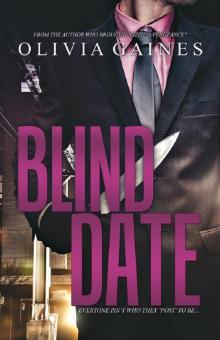 Blind Date (Venture, Georgia Book 3)
Blind Date (Venture, Georgia Book 3)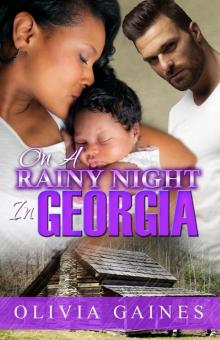 On a Rainy Night in Georgia
On a Rainy Night in Georgia My Thursday Throwback
My Thursday Throwback The Bento Box
The Bento Box A Menu For Loving
A Menu For Loving Thursdays in Savannah
Thursdays in Savannah Blind Hope (The Technicians Book 2)
Blind Hope (The Technicians Book 2) North to Alaska
North to Alaska Becoming the Czar
Becoming the Czar A Weekend with the Cromwells
A Weekend with the Cromwells The Tennessee Mountain Man
The Tennessee Mountain Man Blind Date
Blind Date Blind Fate
Blind Fate Dancing with Mr. Blakemore
Dancing with Mr. Blakemore Friends with Benefits
Friends with Benefits A Walk Through Endurance
A Walk Through Endurance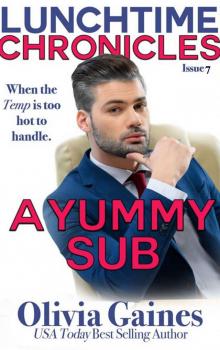 Lunchtime Chronicles: A Yummy Sub
Lunchtime Chronicles: A Yummy Sub Bleu, Grass, Bourbon
Bleu, Grass, Bourbon The Christmas Quilts
The Christmas Quilts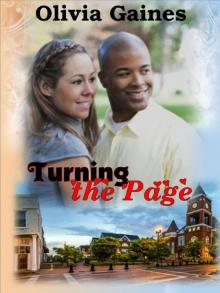 Turning the Page
Turning the Page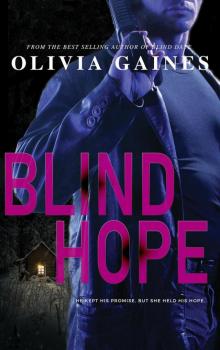 Blind Hope
Blind Hope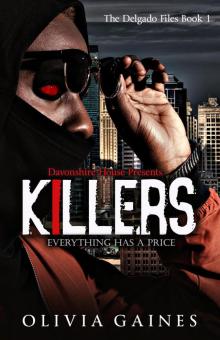 Killers
Killers Blind Luck (The Technicians Series Book 3)
Blind Luck (The Technicians Series Book 3)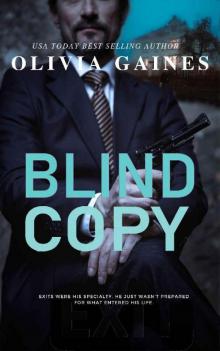 Blind Copy (The Technicians Series Book 5)
Blind Copy (The Technicians Series Book 5) Santa's Big Helper
Santa's Big Helper A Frickin' Fantastic Friday (The Zelda Dairies Book 3)
A Frickin' Fantastic Friday (The Zelda Dairies Book 3) Cruising with the Blakemores
Cruising with the Blakemores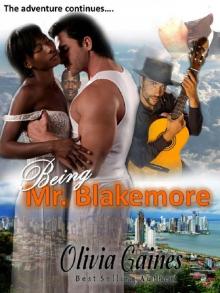 Being Mr. Blakemore (The Blakemore Files Book 7)
Being Mr. Blakemore (The Blakemore Files Book 7) Welcome to Serenity
Welcome to Serenity Shopping with Mrs. Blakemore
Shopping with Mrs. Blakemore Vanity's Pleasure
Vanity's Pleasure Loving the Czar (The Blakemore Files Book 6)
Loving the Czar (The Blakemore Files Book 6) Montana (Modern Mail Order Bride Book 2)
Montana (Modern Mail Order Bride Book 2)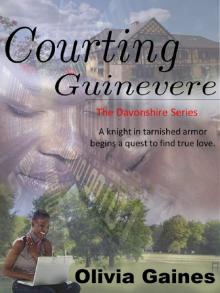 Courting Guinevere (The Davonshire Series Book 1)
Courting Guinevere (The Davonshire Series Book 1) A Tantalizing Tuesday (The Zelda Diaries Book 2)
A Tantalizing Tuesday (The Zelda Diaries Book 2) A Saucy Sunday (The Zelda Diaries Book 4)
A Saucy Sunday (The Zelda Diaries Book 4) Being Mrs. Blakemore
Being Mrs. Blakemore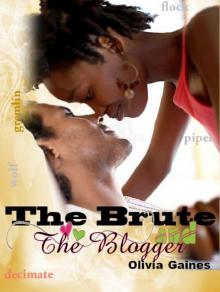 The Brute & The Blogger
The Brute & The Blogger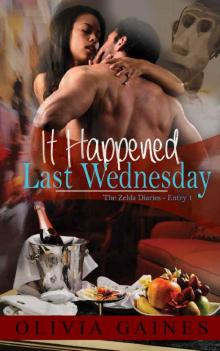 it Happened Last Wednesday (The Zelda Diaries Book 1)
it Happened Last Wednesday (The Zelda Diaries Book 1) A Weekend with the Blakemores (The Blakemore Files Book 8)
A Weekend with the Blakemores (The Blakemore Files Book 8) Buckeye and the Babe
Buckeye and the Babe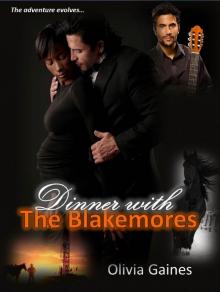 Dinner With the Blakemores (The Blakemore Files Book 5)
Dinner With the Blakemores (The Blakemore Files Book 5)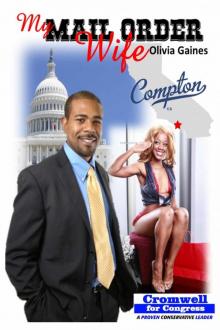 My Mail Order Wife (The Value of a Man Book 1)
My Mail Order Wife (The Value of a Man Book 1)